Nov 11, 2025 Senior Monks’ Pilgrimage to Three Temples, Dialogue with Young VCIL Activists from Vietnam
Hello. Morning has dawned at Dubuk Jungto Retreat Center.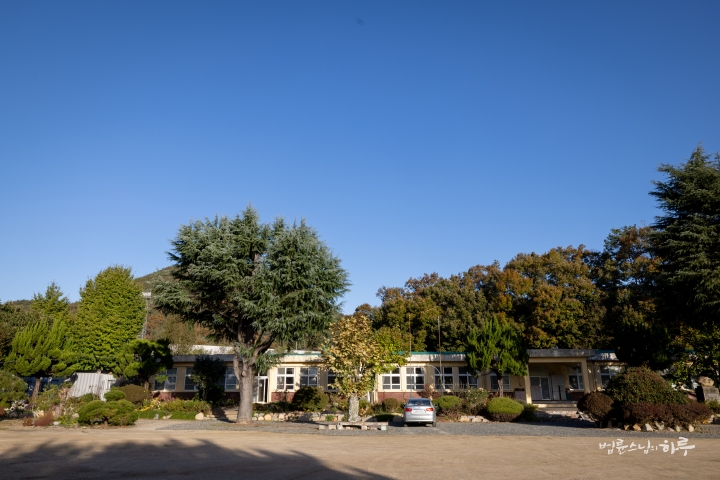
After completing morning practice and meditation, Sunim had breakfast and conversed with the senior monks who had been staying together since yesterday. After the meal, they decided to embark on a pilgrimage to three bhikkhuni temples together.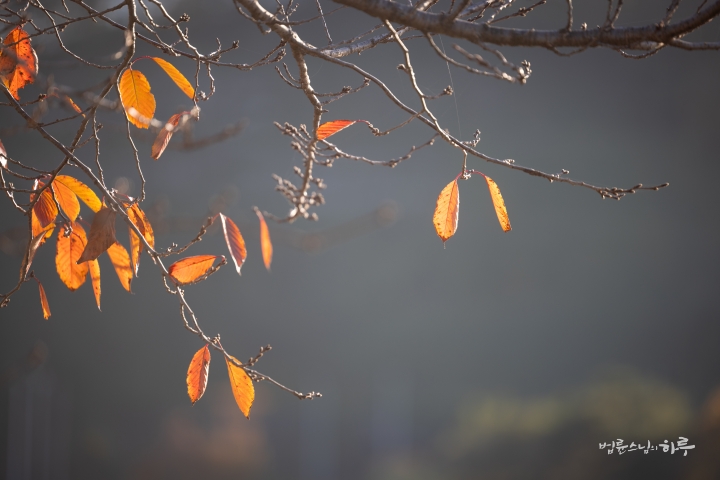
Senior Monks’ Pilgrimage to Three Temples in Deepening Autumn
Venerable Dobup, Venerable Sugyeong, and Venerable Jihong all mentioned it had been a long time since they visited the bhikkhuni temples in this area, so they suddenly adjusted their schedule. In the departing car, Venerable Dobup said with a smile.
“Even though I live in a temple, I rarely go sightseeing to other temples. If there’s no business, there’s no reason to visit other temples.”
They departed from Dubuk Jungto Retreat Center at 8 AM and headed first to Unmunsa Temple. During the journey, high mountains began to appear outside the window. Sunim pointed to the mountains and said:
“Those mountains you see in the distance are the Yeongnam Alps. They’re all mountains over 1,000 meters above sea level.” 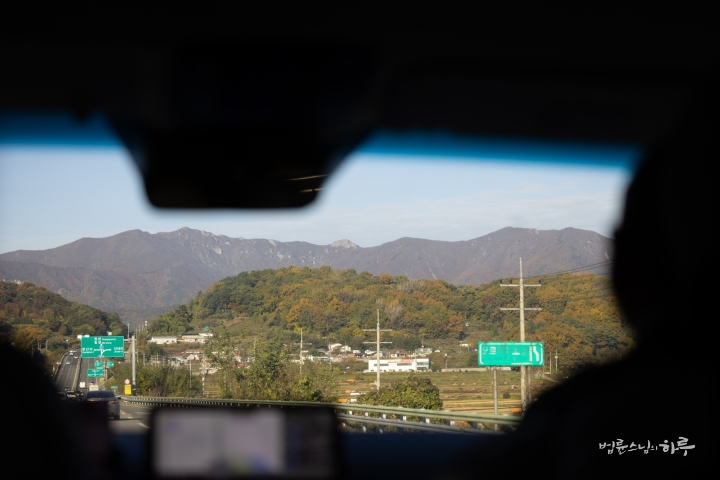
After an hour’s drive, they arrived at Unmunsa Temple. The autumn scenery at Unmunsa was filled with serene and majestic beauty. The temple grounds were colored with vibrant autumn foliage, and warm light enveloped the entire temple.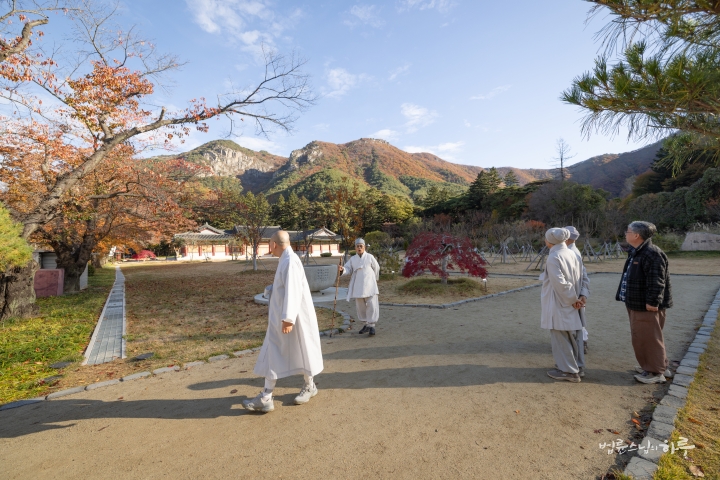
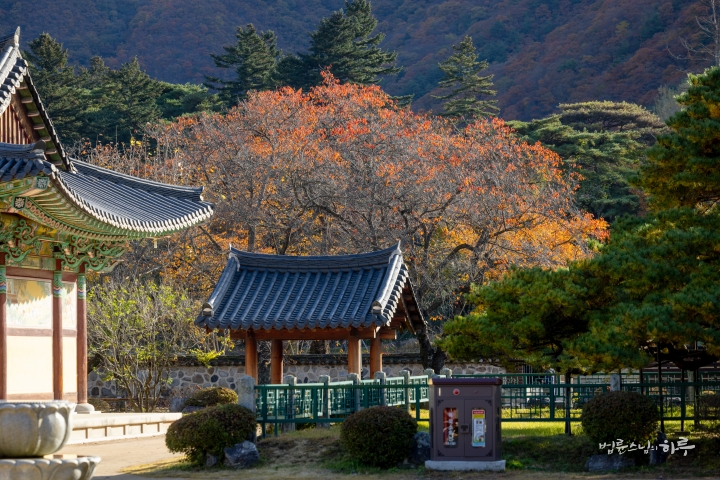
In the tranquil courtyard before the Main Buddha Hall, autumn sunlight spread gently along the curves of the roof, and the mountain slopes behind the hall were beautifully ablaze with yellow and crimson colors.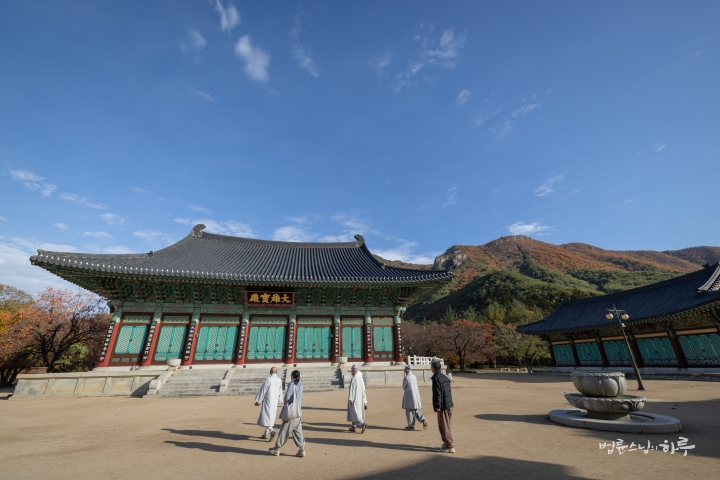
While paying respects at the Main Buddha Hall, Venerable Iljin, the Discipline Master of Unmunsa, heard the news and rushed to welcome the monks.
“It’s such an honor to have such distinguished monks visit our temple all at once.”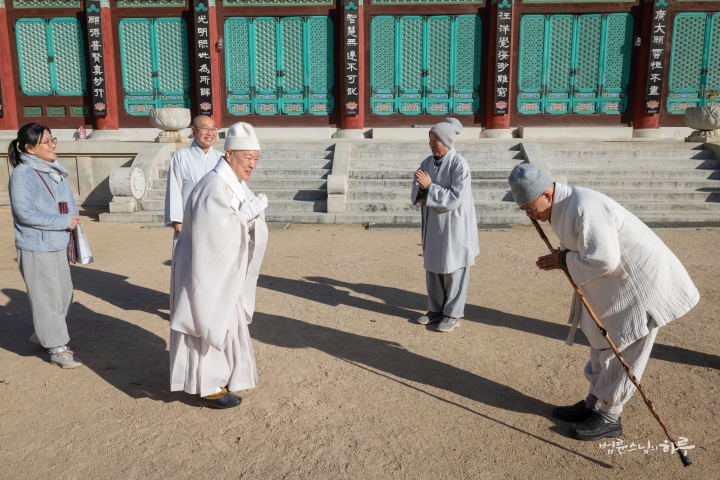
Sunim said with a smile:
“One of the monks here has never been to Unmunsa before. So I came to pay respects together. Sorry for coming suddenly.” 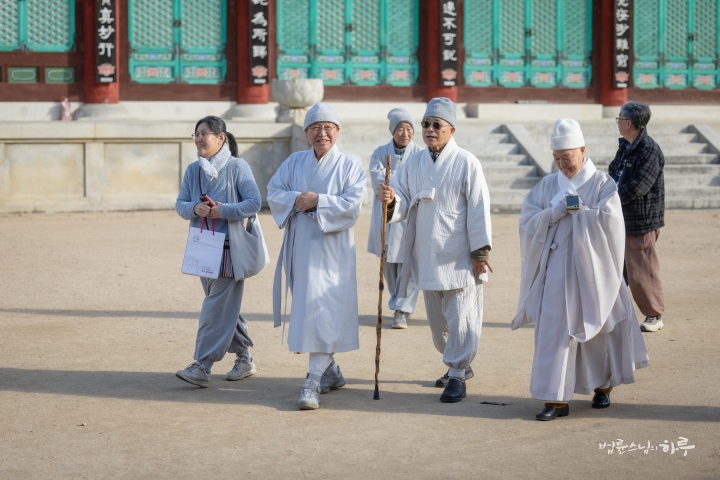
After exchanging warm greetings, they briefly toured the temple grounds. In front of the Sangha College’s Shinildang Hall, a ginkgo tree was colored in golden hues.
“The ginkgo tree is magnificent.” 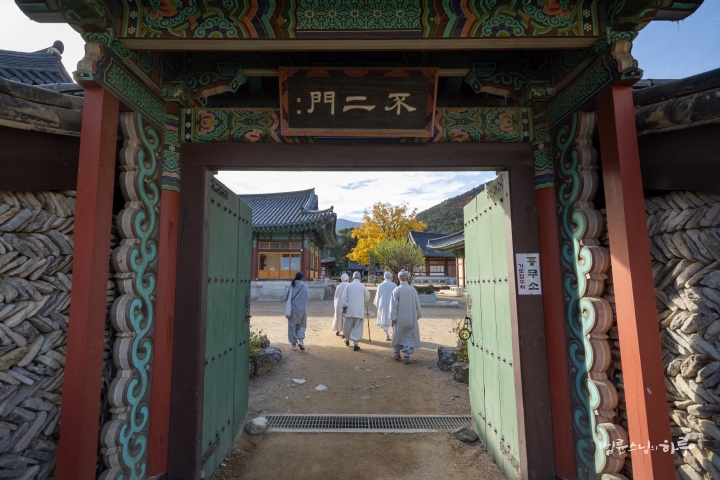
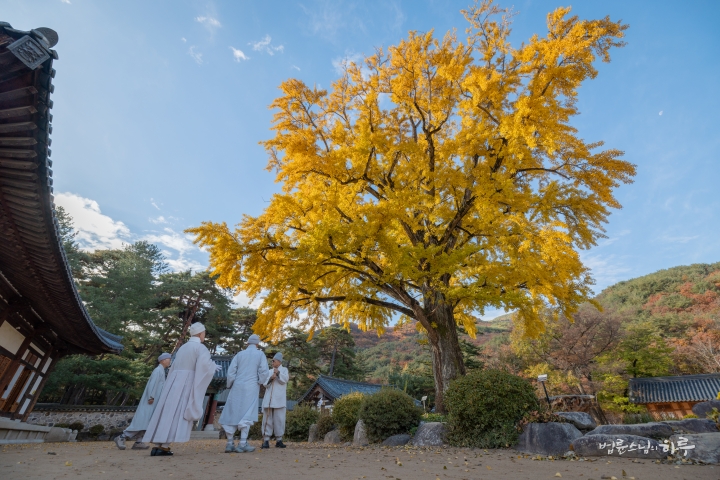
After briefly admiring the ginkgo tree, they entered Seonyeoldang Hall, which is used as a lecture venue. Venerable Iljin guided them through various places.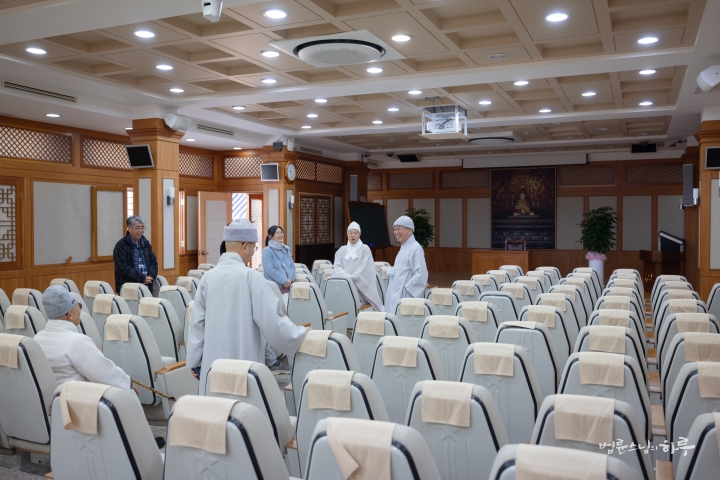
“This is where lectures are held. Venerable Pomnyun has given lectures here for the student monks. Our Unmunsa has a really beautiful tea room. Please have a cup of tea before you go.”
After touring Seonyeoldang Hall, they headed to the tea room. Upon entering, they could see the autumn scenery of the valley through the window.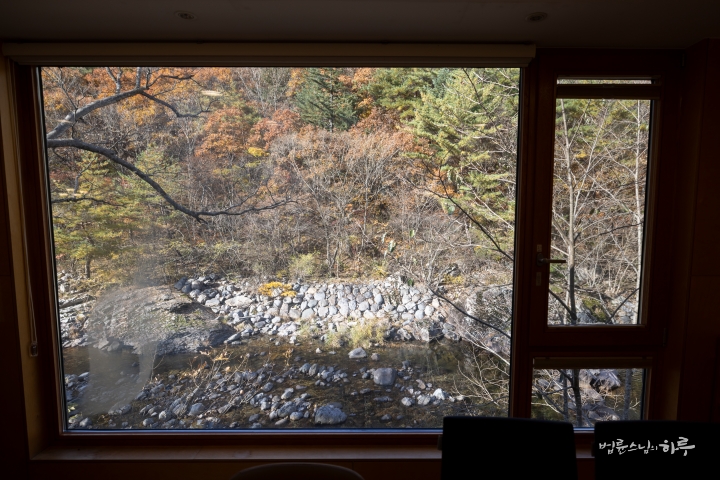
They sat in the tea room for a while and conversed. While serving tea, Venerable Iljin asked:
“How did such distinguished monks, who are difficult to meet, all come together?”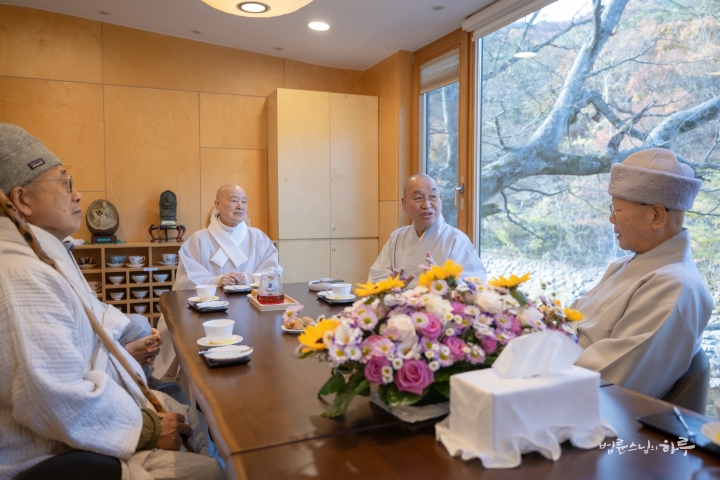
Venerable Dobup said with a smile: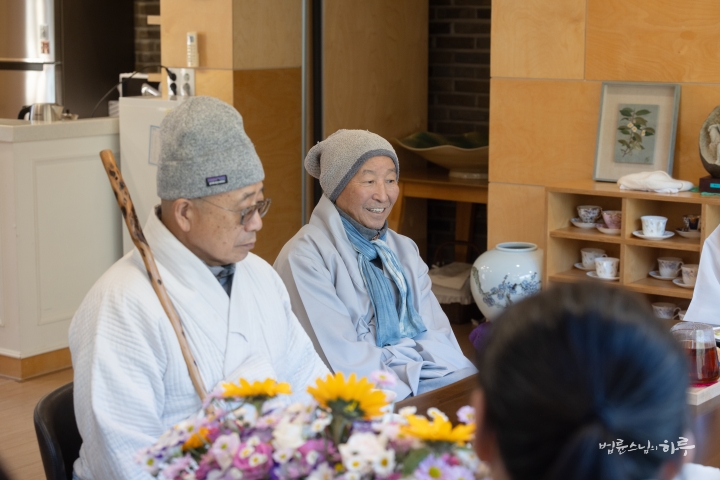
“Those of us who have been pushed aside from the mainstream and marginalized have been comforting each other, so we meet often. Since we’re all aging together, we decided to meet once or twice a year. Venerable Pomnyun farms at Dubuk Jungto Retreat Center. Since we meet there, we call it the Dubuk gathering.”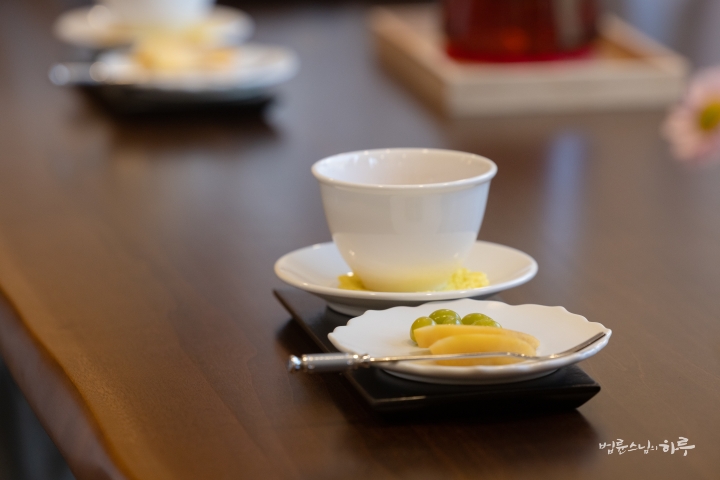
They naturally talked about Unmunsa and shared concerns about the decreasing number of monastics.
“How many bhikkhuni monks live at Unmunsa now?”
“In the past, about 250 lived here, but now it’s decreased to 50.”
The conversation flowed freely with everyone contributing their thoughts.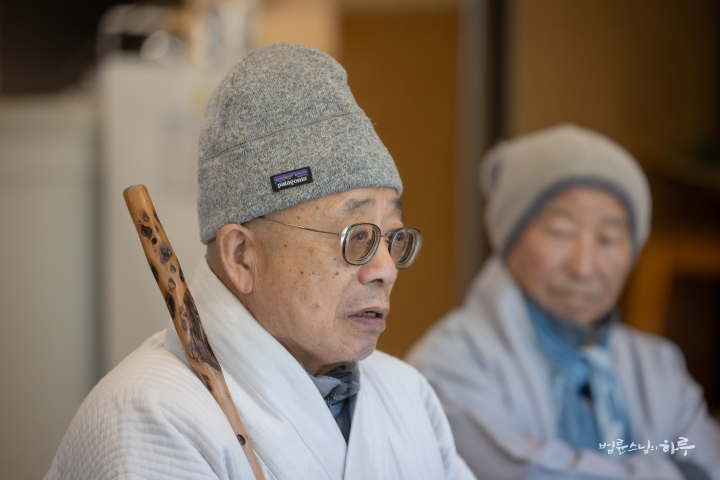
“It’s not just Buddhism that’s seeing a decrease in monastics. I recently met a priest who said there are no people in Jeollabuk-do who want to become priests.”
“I was invited to give a lecture at a convent. Recently, three new people entered wanting to become nuns, but they were all foreigners from Chile, Vietnam, and the Philippines.”
“Many say the era of established religions is over. So there seems to be a lot of discussion about where religions should go from here.”
Finally, Sunim shared about his connection with Venerable Iljin.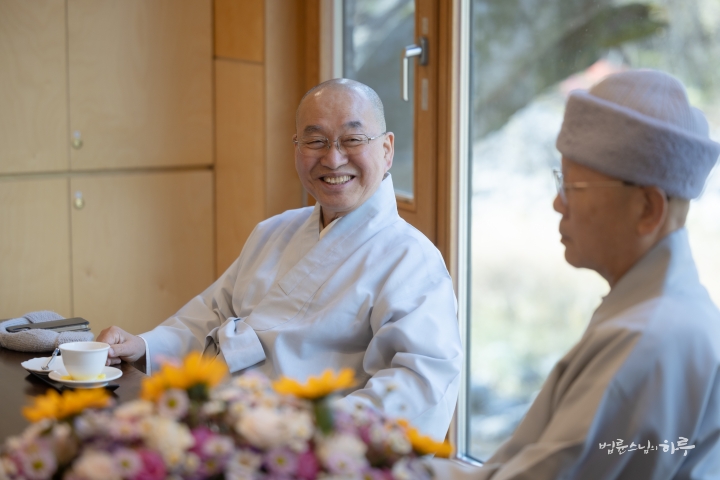
“I first met Venerable Iljin during the opposition to the bhikkhuni film screening. At that time, I thought we needed protests demanding an official government apology regarding the October 27 Dharma Crisis, so I persuaded the senior bhikkhuni monks with tears in my eyes. One of the three bhikkhuni monks who took charge of practical matters at that time was Venerable Iljin. At that time, Venerable Iljin was a student at Dongguk University, right?”
“Yes, that’s right. I was able to write in blood and read the vow statement because Venerable Pomnyun helped so much from behind the scenes. If Venerable Pomnyun hadn’t helped then, I wouldn’t have been able to do it.”
They had been passionate activists in their vigorous youth, and now they sat face to face again as septuagenarians with welcoming faces. As they recalled old memories one by one, smiles naturally spread across their faces.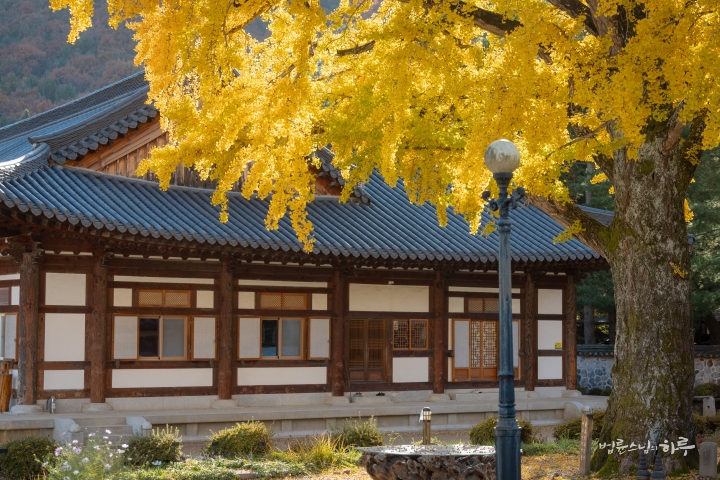
After finishing their conversation, they walked out of Unmunsa to move to the next location. The scenery of the mountain slopes visible when leaving Unmunsa was also quite spectacular.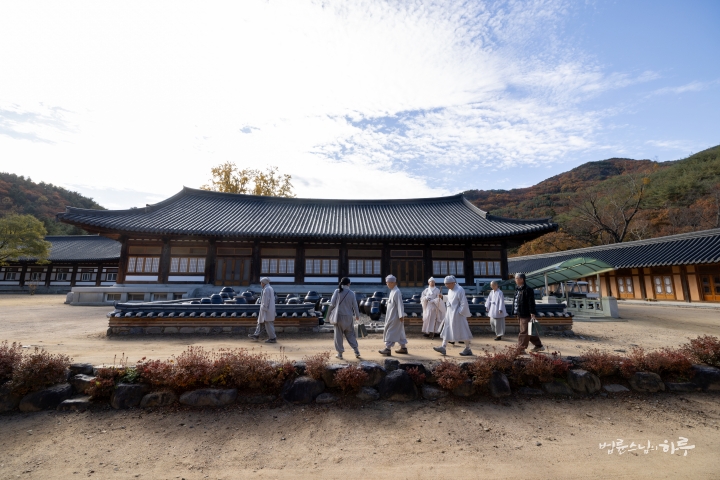
“Look at the autumn colors on the mountain. Unmunsa’s Sariam Hermitage is up on that mountain.” 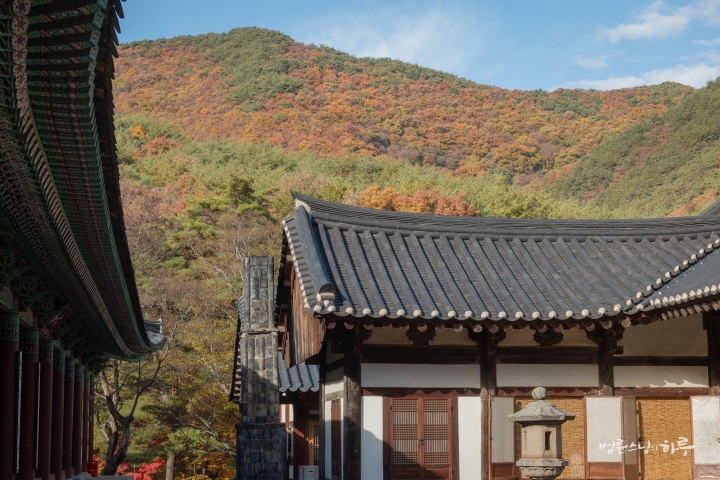
After expressing gratitude to Venerable Iljin for the kind hospitality, they exited through the One Pillar Gate.
“Thank you. We had a good visit.”
They got back in the car and headed to Seoknamsa Temple. This is also a bhikkhuni temple. After crossing another mountain pass and driving for 30 minutes, Seoknamsa appeared.
“The scenery here is also very beautiful. Let’s go take a look.”
Walking along the stone wall path beside the valley and climbing the tranquil stone steps, a majestic three-story stone pagoda revealed itself.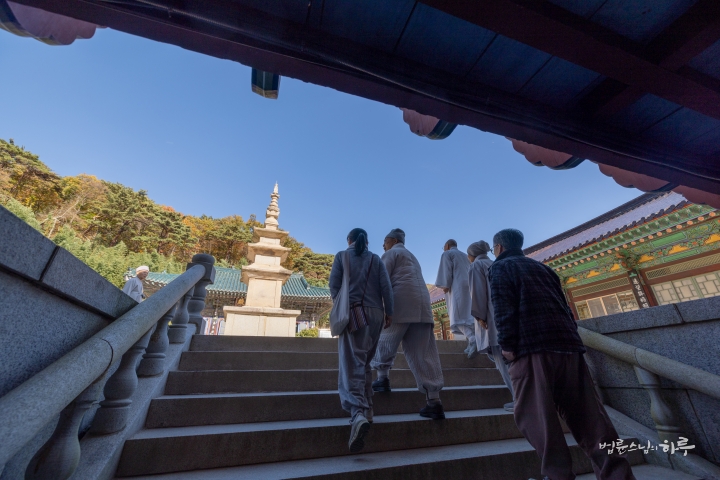
After paying respects at the three-story stone pagoda, they entered the Main Buddha Hall and performed three prostrations. Since the bhikkhuni monks were conducting their midday prayer, they quietly paid their respects and came out to the courtyard.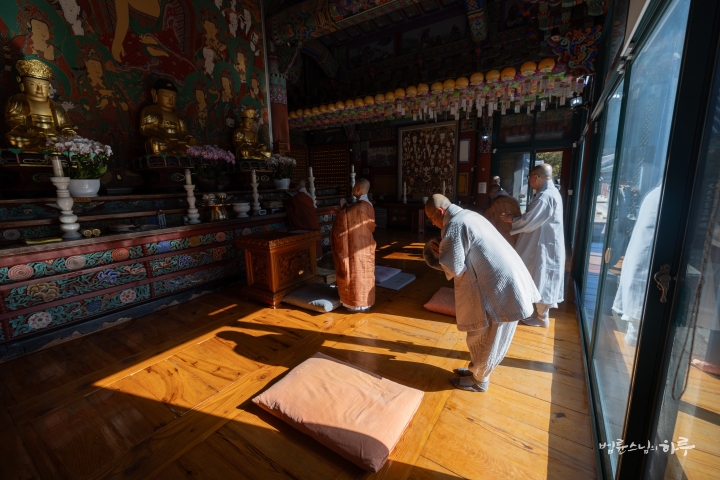
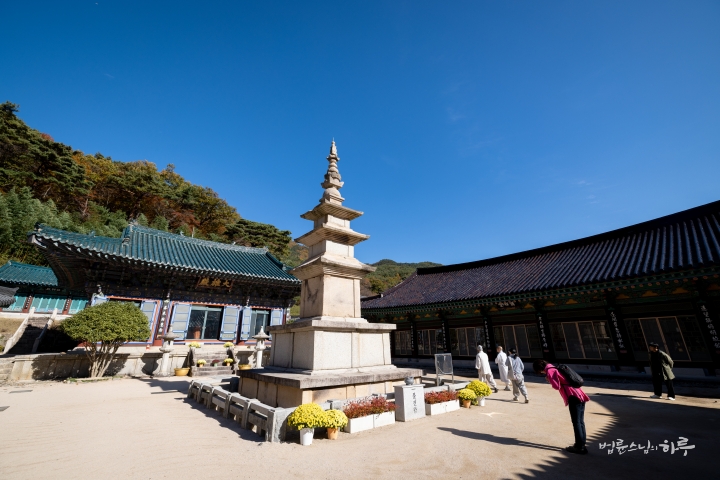
The abbess, belatedly learning of their visit, hurriedly came out to greet them.
“If you had told us in advance, we would have at least prepared a meal. I’m sorry.”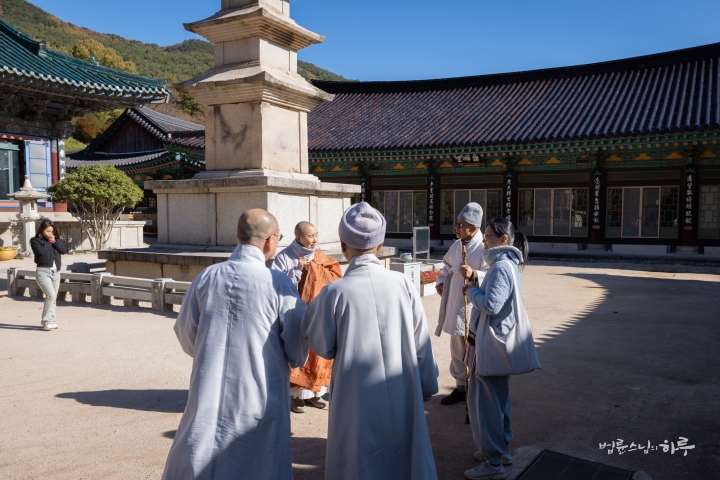
Sunim said with a smile:
“No, it’s fine. We just came to pay our respects briefly.” 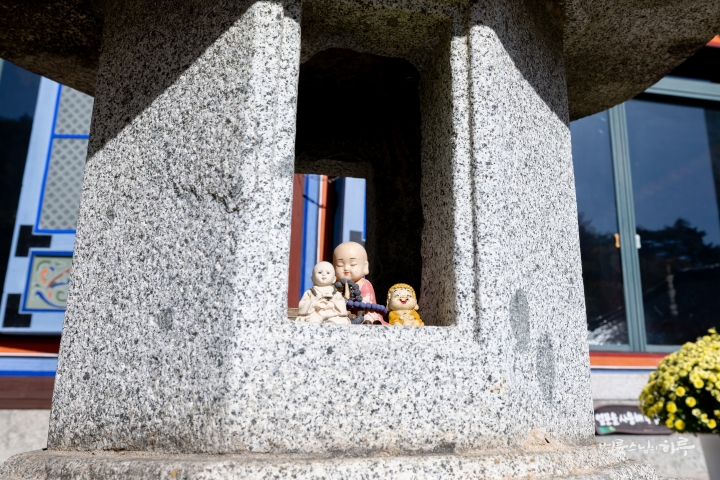
They barely declined the request to stay for lunch and left Seoknamsa. The valley was beautifully colored with autumn foliage, and leaves quietly fell whenever the wind brushed by. Coming down the mountain path, their hearts felt lighter in the tranquil scenery.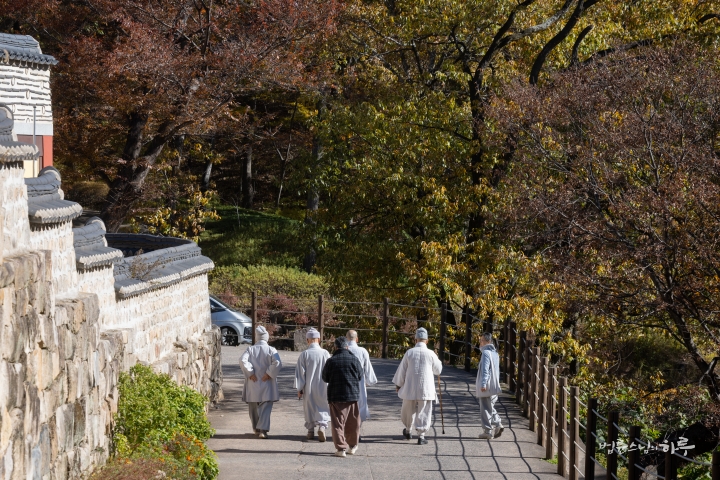
At 11 AM, the monks headed to Naewonsa Temple. During the journey, Venerable Jihong, who had served as the Director of the Jogye Order’s Propagation Center, said: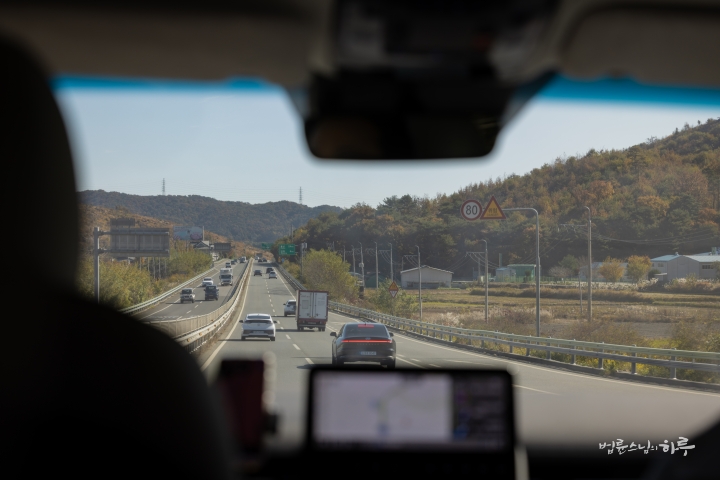
“This is my first time visiting Naewonsa.”
Sunim said with a smile:
“Since Venerable Jihong has never been to Naewonsa, I think you shouldn’t tell people you were the Director of the Jogye Order’s Propagation Center anymore.” (laughter)
While conversing and laughing, the car entered the Naewonsa valley. The valley path along the mountain slopes was colored red with autumn foliage, naturally drawing exclamations of admiration.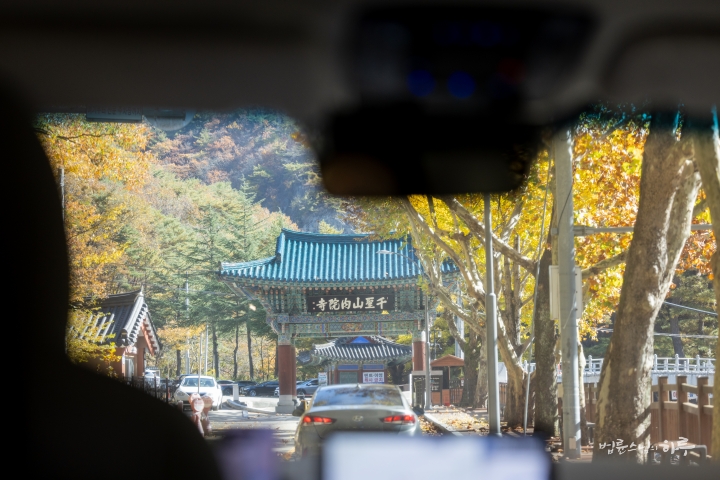
After arriving at Naewonsa, they first paid respects at the Main Buddha Hall. The canopy, a decorative roof-shaped structure built above the altar, was very elegant. After paying respects, Sunim said: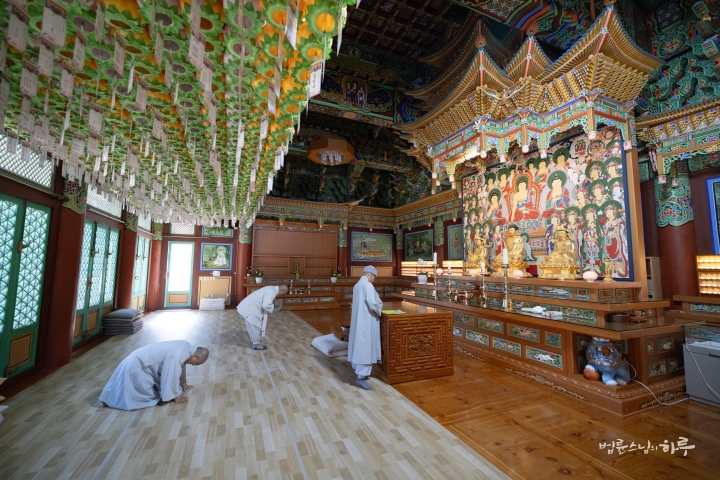
“The Buddha slept under trees, so where did the culture of making elaborate canopies above Buddha statues come from?”
When they came out of the Main Buddha Hall, many children were visible. Naewonsa operates a kindergarten for children. A teacher wanted to take a photo together, so they took a group photo.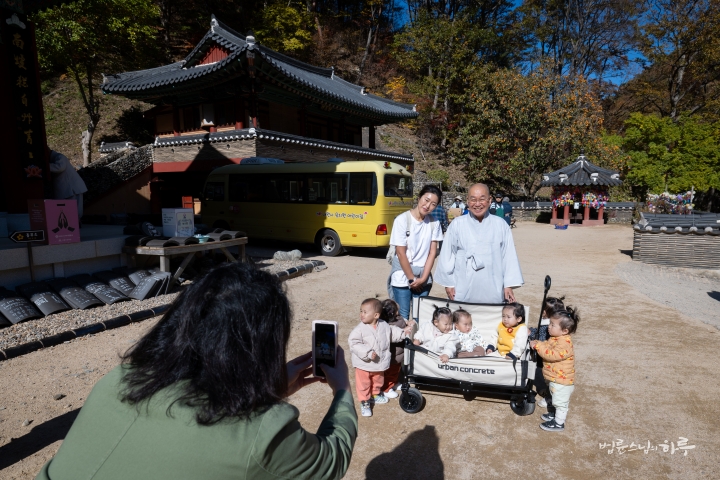
Hearing the news of the monks’ sudden visit, the abbess of Naewonsa also hurriedly came out to greet them.
“Welcome. Please have a cup of tea before you go.”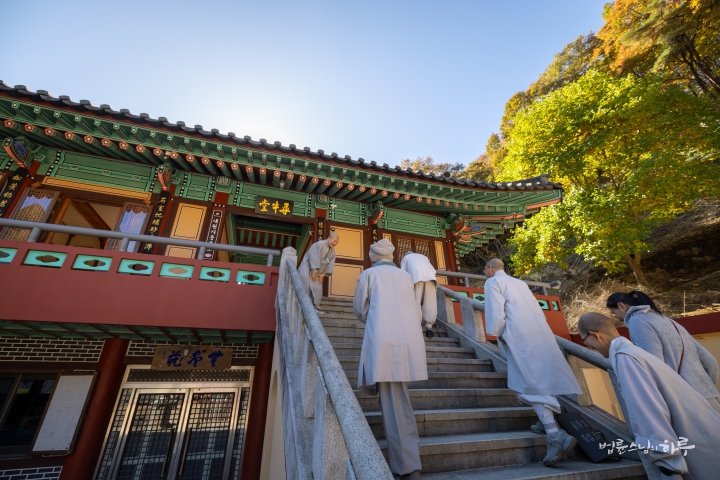
After exchanging greetings with the abbess, they headed to the tea room together.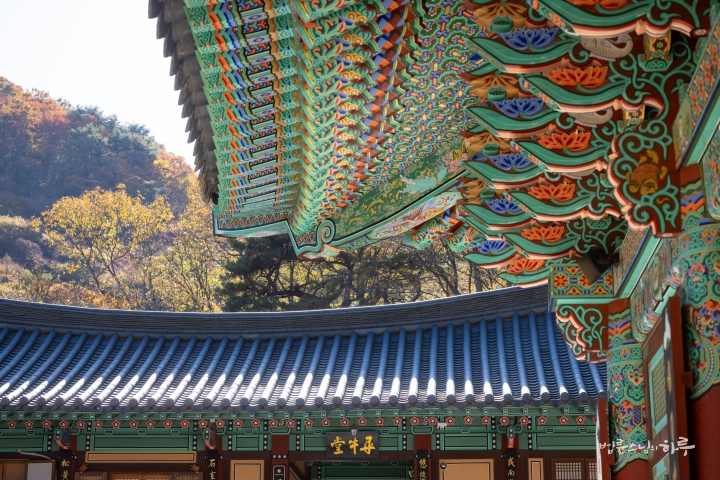
The tea room was cozy and beautiful. The abbess carefully served fermented pine needle tea, and they conversed about various topics while drinking tea. Sunim opened the conversation: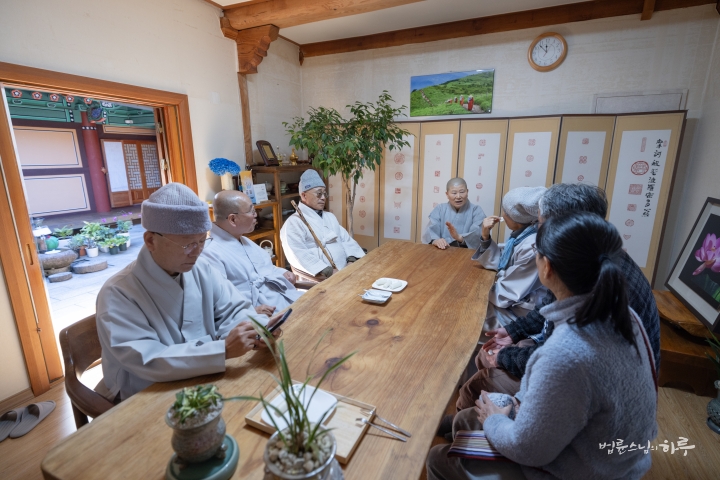
“Venerable Jiyul fasted for a hundred days to save Cheonseongsan Mountain here. I visited this place several times trying to save Venerable Jiyul then. Venerable Dobup, how long has it been since you’ve been here?”
“I came 30 years ago, and this is my first time since then.”
The monks asked the head monk about their questions regarding Naewonsa Temple and the hermitages in the mountains, and the head monk answered in detail.
“How many people are practicing in the meditation hall?”
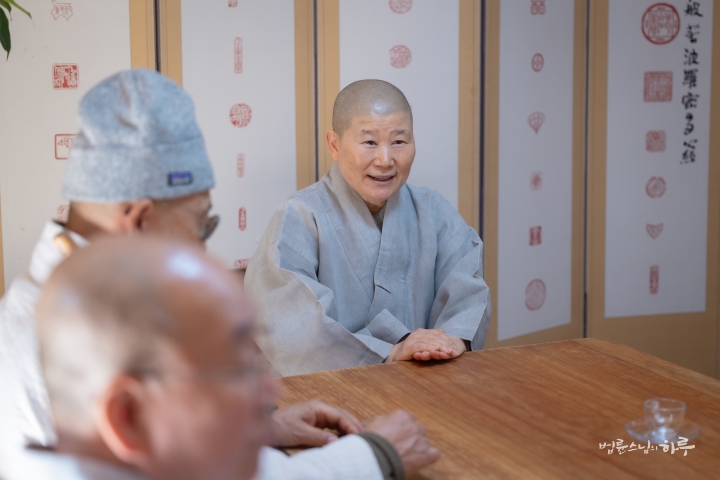
“In the past, this was a space where 50 people practiced, but now only about 15 people live here. The number keeps decreasing.”
“If the number of monks continues to decline, should we convert it to a lay practitioner’s meditation center?”
“Naewonsa is a place with deep historical significance where many great masters came to practice, so it’s still one of the places where many monks wish to come for their spiritual practice.”
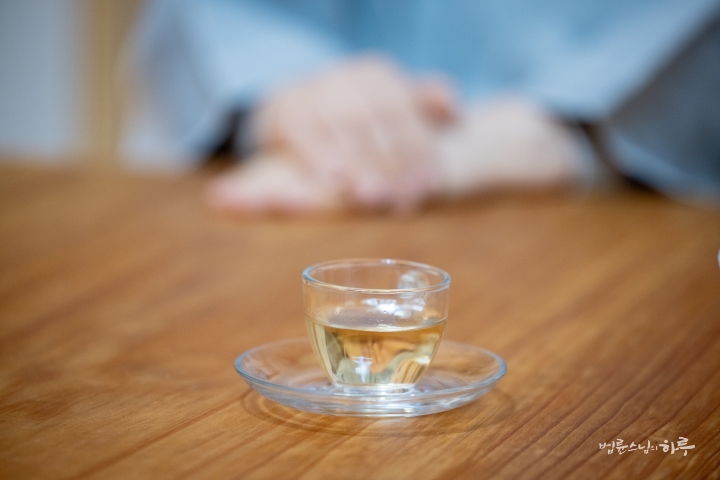
After finishing tea, they hurriedly left Naewonsa Temple. They barely managed to refuse the head monk’s attempt to give us money for our meal, despite our sudden visit, and got into the car.
As we descended along the Naewonsa valley, sunim added an explanation:
“Naewonsa is also where Choe Je-u, the great teacher who founded Donghak, practiced asceticism before achieving enlightenment. It’s said that after his spiritual training here, he went to Yongdamjeong in Gyeongju where he attained enlightenment.”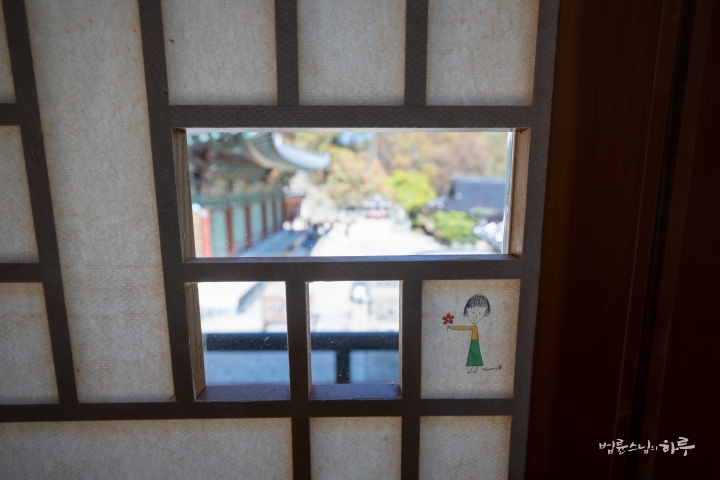
The valley was truly deep. On the way back to Dubuk Jungto Retreat Center, all the monks expressed their satisfaction.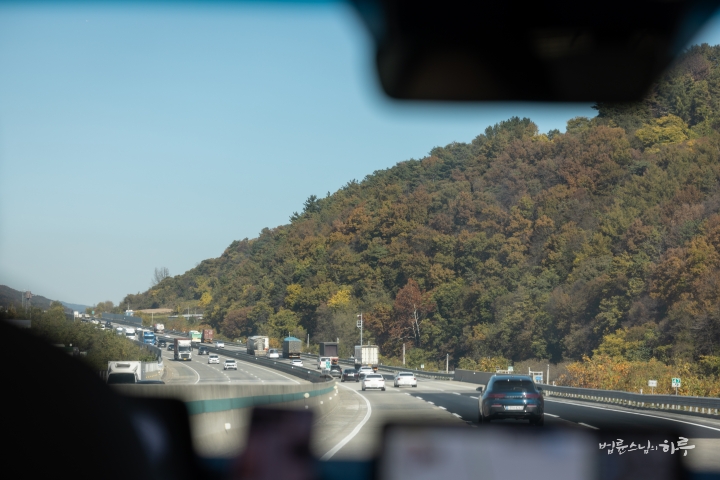
“Thanks to you, we had a wonderful pilgrimage to the three temples. We even got to have tea thanks to Venerable Pomnyun Sunim. Who would offer tea to old monks like us if we came alone?”
Sunim replied with a smile.
“Not at all. It’s thanks to all you senior monks that we received such a warm welcome. Let me treat you to noodles for lunch.”
They returned to Dubuk Jungto Retreat Center at 1 PM and had lunch.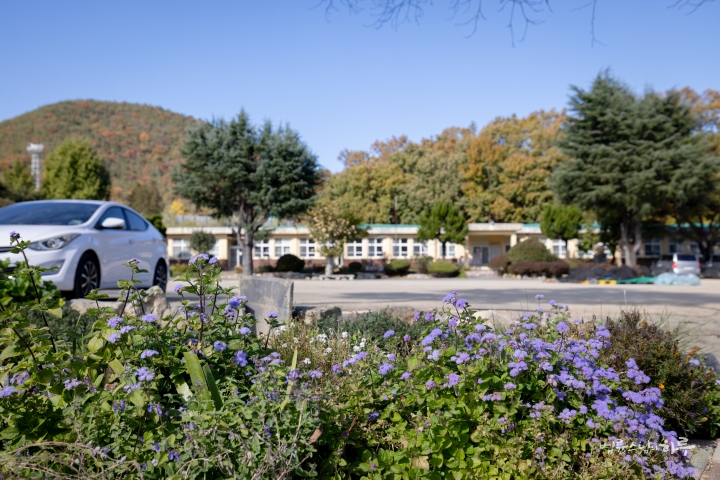
After finishing lunch and continuing their conversation, they departed from Dubuk Jungto Retreat Center at 2:30 PM to escort the monks to Gyeongju Station.
After dropping off Venerable Jihong at Gyeongju Station first, Sunim toured the area around King Muyeol’s Tomb with Venerable Sugyeong. At 4 PM, after dropping off Venerable Sugyeong at Gyeongju Station, Sunim returned to Dubuk Jungto Retreat Center.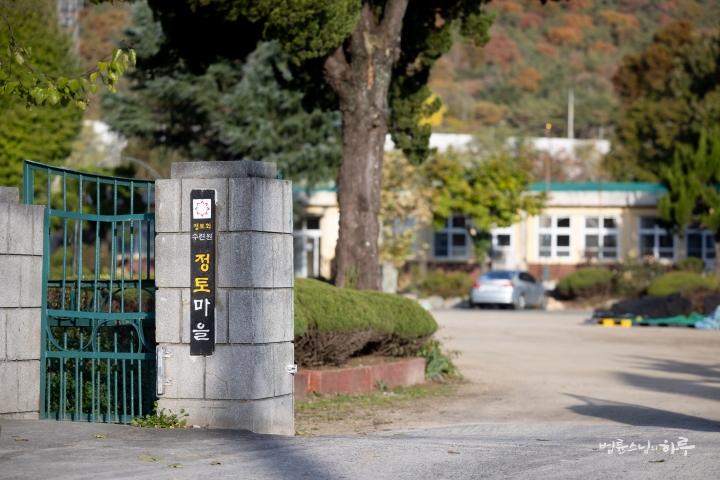
As the sun set, starting at 6:30 PM, Sunim had a dialogue session with young people who came to visit Jungto Society, hosted by VCIL (Vietnam Community of Integral Living), a youth organization from Vietnam.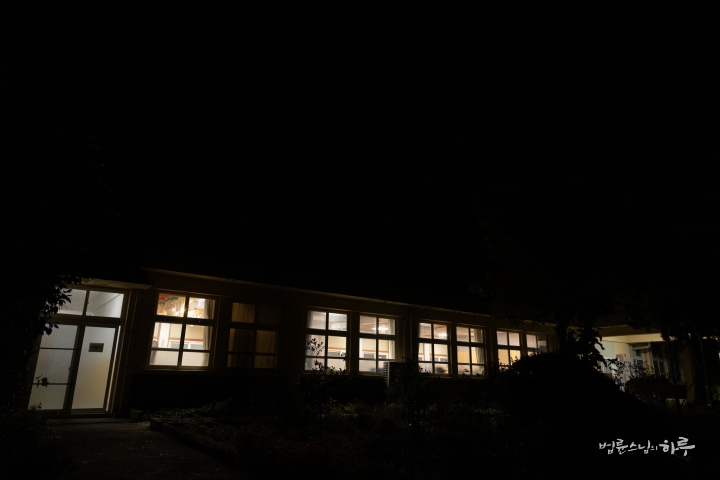
The Vietnamese youth were conducting a 14-day tour program under the theme ‘Republic of Korea: From Miraculous Development to Sustainable Alternatives,’ examining both the light and shadows of South Korea. Over the past 9 days, they had visited various places including Gyeongbokgung Palace, the National Museum of Korean Contemporary History, the DMZ, and Silsangsa Temple. Starting today, they planned to stay at Dubuk Jungto Retreat Center for 4 days to observe Jungto Society.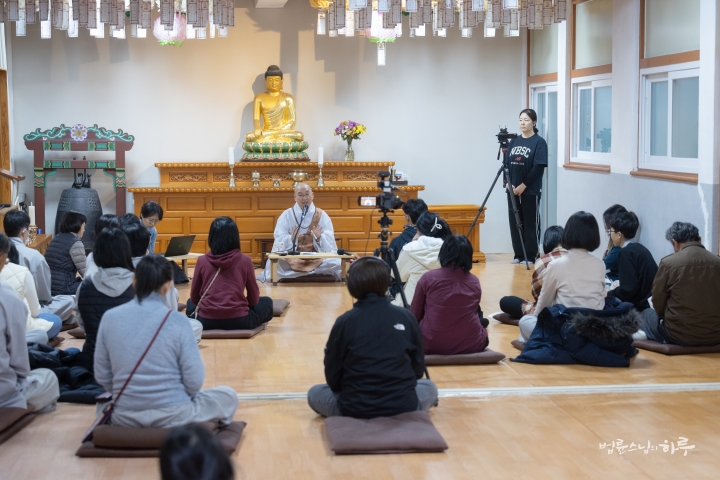
When the Vietnamese youth requested a Dharma talk from Sunim with three prostrations, Sunim began his talk with a smile.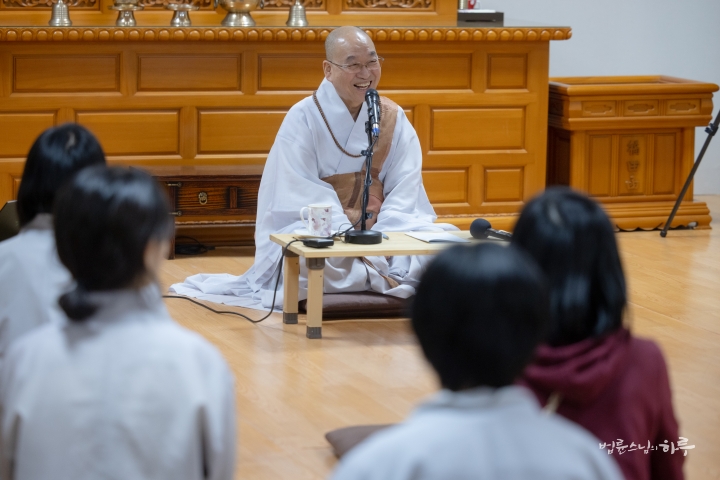
“First, if you have any questions about Korea or Buddhism, please ask them. After answering your questions, I’ll add more if I have anything else to share.”
The Vietnamese youth began asking questions without hesitation.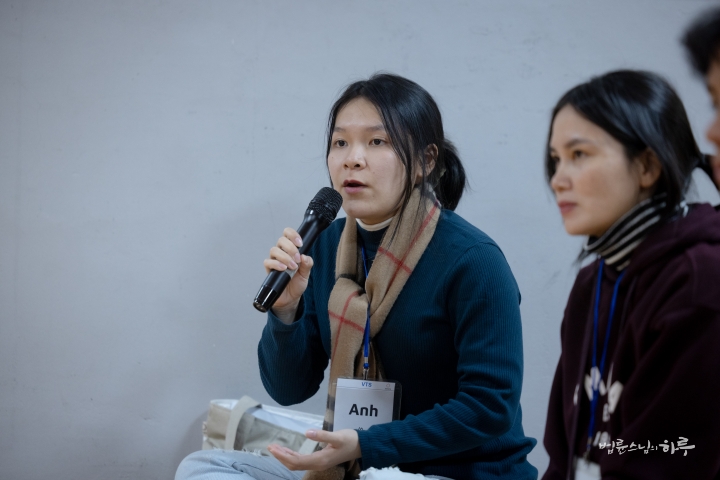
How Will Jungto Society Continue After Venerable Pomnyun Sunim Leaves?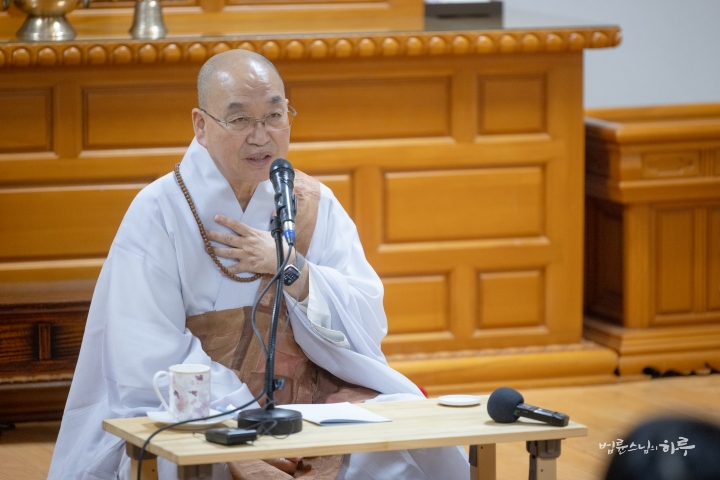
“Your question is essentially asking, ‘Can Jungto Society’s activities continue to be carried on by future generations?’ Most people tend to think of this question as ‘Who will replace Venerable Pomnyun Sunim?’ However, this thinking comes from a secular perspective. It’s similar to wondering who will be the next king or president. But this is different from the leadership spoken of in Buddhism.
Even during the Buddha’s time, there was someone who thought this way, Devadatta. When the Buddha became elderly, Devadatta said, ‘Buddha, please rest now. I will take over and fulfill that role.’ The Buddha then replied.
‘Practitioners don’t need a special leader. Practitioners will live as their own masters according to the Buddha’s teachings, and the Sangha, the community of practitioners, will fulfill that role.’
In other words, in a society without the Buddha, leadership is not given to a specific individual, but the entire Sangha takes on that role. The phrase ‘taking refuge in the Three Jewels – Buddha, Dharma, and Sangha’ means taking refuge in the Buddha, his teachings, and the Sangha, the community of practitioners. Among these, the reason for taking refuge in the Sangha is that after the Buddha’s passing into nirvana, the Sangha takes on the Buddha’s role. 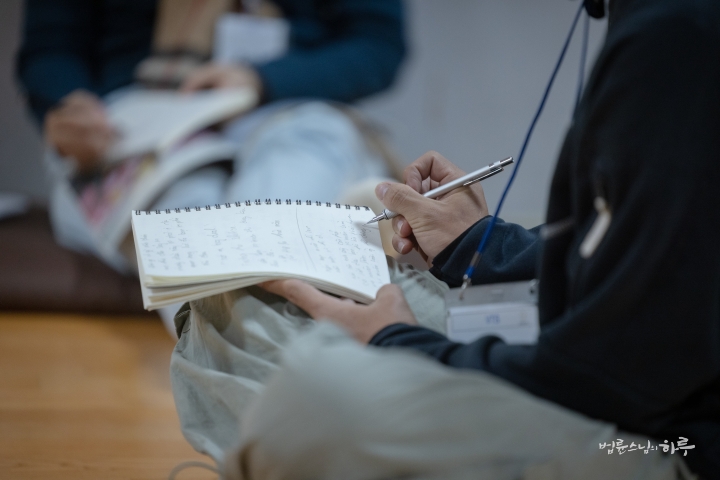
Jungto Society also constitutes a Sangha and operates democratically. I believe this structure and operational method will ensure sustainable leadership for future generations. Therefore, Jungto Society aims for a form where the entire organization has leadership through democratic operation, rather than concentrating leadership on a specific individual. Even now, Jungto Society is meticulously preparing its leadership system as a Sangha community.
Of course, since I founded Jungto Society and my name is widely known, many people worry about what will happen to Jungto Society after I die. However, these concerns stem from a misguided perspective. It’s like thinking Buddhism would disappear when the Buddha entered nirvana. But Buddhism actually spread more widely through the Sangha after the Buddha’s nirvana. I believe Jungto Society’s activities will be carried on in the same way.” 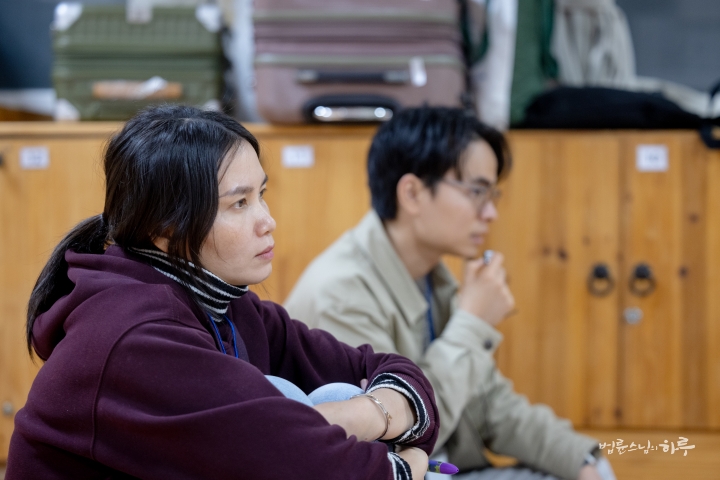
A young person, with tears welling up in their eyes, shared their concern for their grandmother.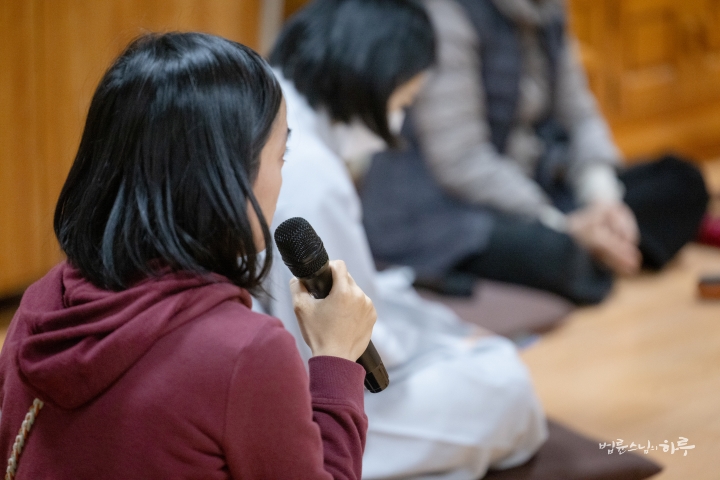
My Grandmother Lost Her Husband, Child, and Grandchild. Can I Help Ease Her Pain?
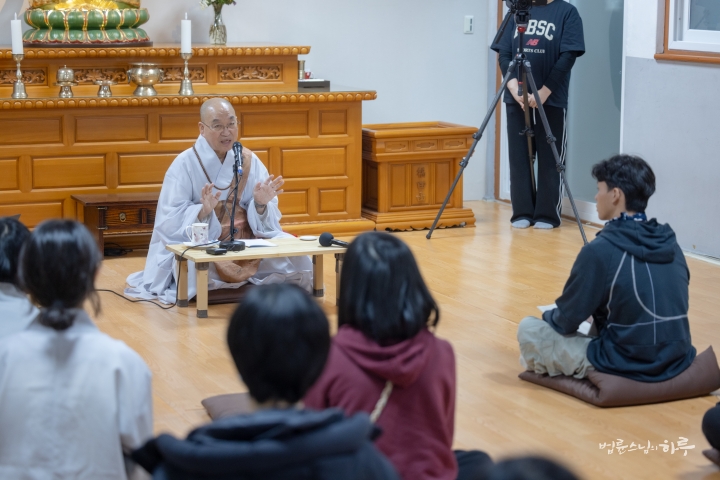
“When we live life, not everything we want comes true. But people mistakenly think that what they want must happen and become attached to it. When what they want doesn’t happen, they suffer. However, no matter how attached we are, not everything we want will come true. But if we understand that ‘what we want may not always happen,’ there’s no reason to suffer. If it doesn’t work out, we can let it go, or if necessary, we can try again. But there’s no need to suffer.
Similarly, we cannot fulfill everything others want from us. There are things we can do and things we cannot. But if someone becomes attached to the idea that we must fulfill everything they want, suffering arises when we cannot. So why is your grandmother suffering? Your grandmother couldn’t prevent her husband from passing away, her child from leaving this world, or her grandson from dying. She suffers because she couldn’t protect the family members she loved. If you look closely, the reason you and your grandmother suffer is the same. You’re also struggling because you cannot help your suffering grandmother. You wish ‘your grandmother wouldn’t suffer even though she lost her husband, son, and grandson.’ But even if your grandmother suffers, you shouldn’t suffer. Suffering along with your grandmother is neither compassion nor practice. You suffer simply because of ignorance. Just as your grandmother is ignorant, so are you. 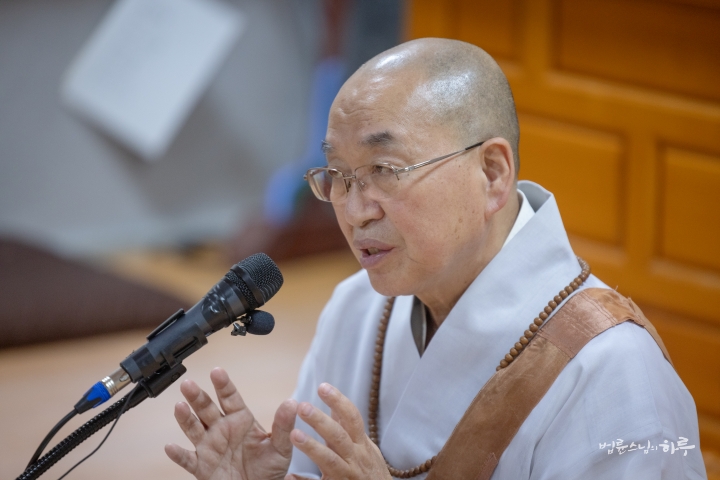
When her husband passed away, there was nothing the grandmother could do to save him. All she could do was hold the funeral, and though her husband had departed, continue living her life happily. If she could have saved her son, of course that would have been better. But if she couldn’t prevent her son’s death, the only thing she could do was hold the funeral. The reason the grandmother suffers is because she’s trying to do something she cannot do. In other words, her suffering comes from ignorance. Similarly, you cannot change the grandmother’s suffering for her. Since the grandmother has lost her husband, child, and grandchild, it’s difficult for her to easily escape from her grief. But now you too are being ignorant and unable to escape from that suffering. The core of the problem lies not with the grandmother, but within your own mind.
So what can you do? Making the grandmother not suffer is not something you can do. Just as the grandmother cannot bring her dead son back to life, you cannot change the suffering grandmother. But you’re thinking that you can do this. That’s why you’re suffering because it’s not working. So don’t cling to what you cannot do, and do what you can. Hold her hand, share a meal with her and comfort her, do the small things you can do. Ultimately, this problem is not the grandmother’s problem, but your own. No matter how much the grandmother struggles, when you can look at her with a peaceful mind, you can actually find ways to help her. It’s impossible to make the grandmother escape from suffering when you yourself cannot do it.”
“Thank you. I understand well.”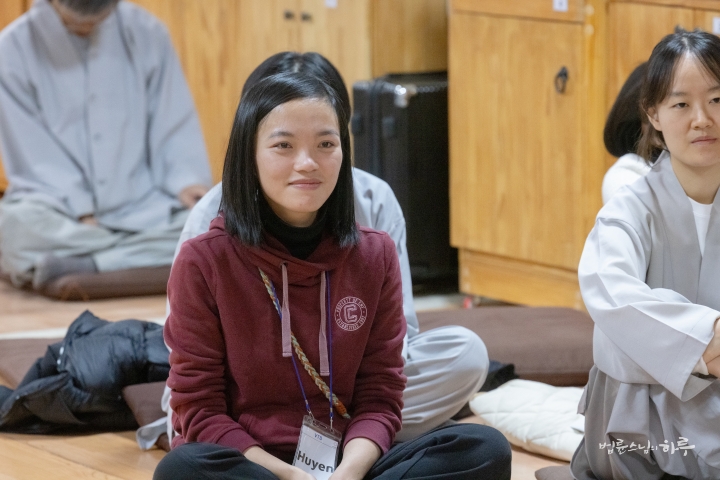
Questions continued one after another.
How and why did Jungto Society begin? To what extent have you achieved your goals?
Life has good and bad things, how do we find that balance?
I visited Silsangsa Temple, and there too, young people living in rural areas are gradually disappearing. I heard Bhutan is the same. Is there a solution to this?
I’m a sensitive person, how can I maintain inner peace while engaging in social activities?
What is true happiness?
I didn’t go to university so I have 4 years of time, how can I find my destined career?
How can we solve the Korean Peninsula division problem?
When I learned Barugongyang, it was very complicated. Is there a reason for eating with such complex rituals?
As the conversation was coming to an end, the last questioner raised their hand high and asked Sunim a question.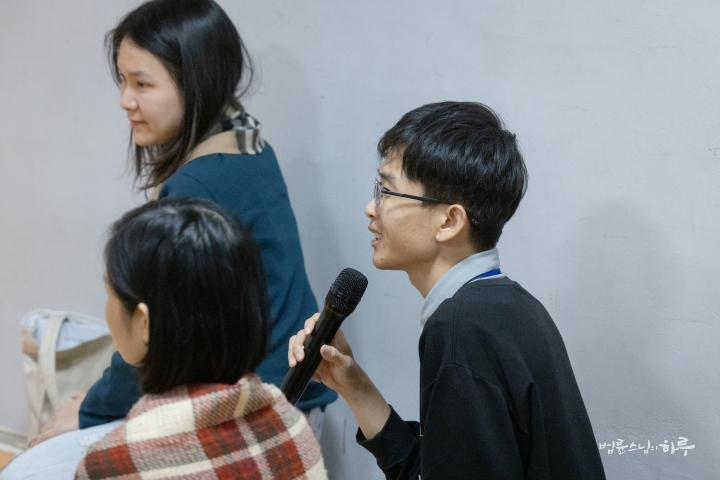
In This Era Different from Your Youth, How Should We Young People Live?
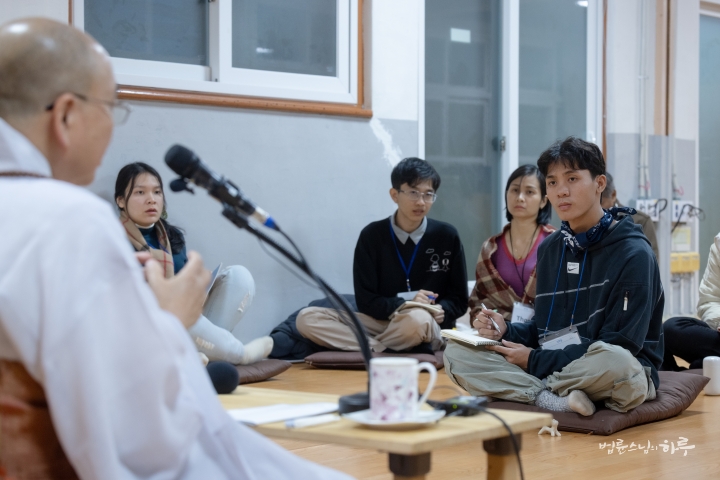
“If you’ve felt a sense of problem, that’s when it begins. How old you are doesn’t really matter. The senior monks who spent time with me yesterday and today all have social consciousness, but they became interested in social issues after they turned forty. When they first started their monastic life, they wondered ‘Why are they doing that?’ when they saw people raising social issues. But now they’re participating in social issues even more actively than I am. Like this, age doesn’t matter at all. The moment you recognize and become aware of the problem yourself becomes the starting point.
You are young compared to me, but I don’t think you’re young at all. If you were fifteen or sixteen, I could say you’re young, but once you’re over twenty, you’re already an adult. After becoming an adult, age doesn’t matter. The problem is that you still think like children. So it’s not that you’re young, but that I’m old. (laughter) 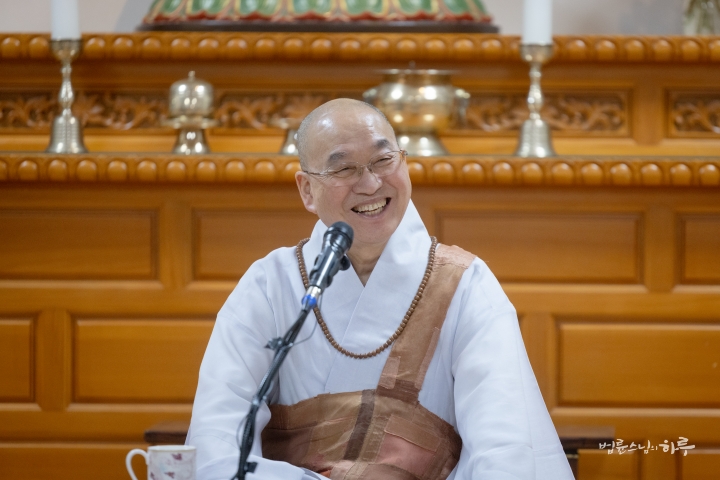
Looking at history, most people who took an interest in social issues and took action were between sixteen and twenty years old. At twenty, you’re already an adult. In the past, many people became kings before they even turned twenty. That means at twenty, you’re old enough to govern a country. So why do you keep thinking ‘I’m still young’? Just consider yourself an adult.
It’s easier to understand if we use lions as an example. Let’s assume a lion becomes an adult at three years old. Once it’s fully grown, whether it’s three or six years old, it’s just a lion. We only call it a ‘young lion’ when it’s a cub. Once it becomes an adult, age doesn’t matter. It’s the same with dogs. Once they’re fully grown, they’re just dogs. We only use the word ‘young’ until they become adults. It’s the same for you. Now you should think ‘I am an adult’ and act accordingly. For adults, taking responsibility is more important than claiming rights. There’s no set time when you should start. The moment you become aware, that’s when it begins.
Your enthusiasm to come all the way to Korea to study is truly remarkable. Perhaps that’s why your eyes sparkle much more than those of Korean youth. Good conditions aren’t necessarily always beneficial. Of course, it would be problematic if conditions were too poor, but Vietnam’s current environment might actually be suitable for young people to take on challenges. It’s similar to Korea in the 1980s. The young people who participated in student movements during that time are now leading Korean society. Some gave up university to enter labor sites and engage in labor movements, while others went to rural areas for farmers’ movements or to slums for poverty movements. The courage, challenges, and experiences they accumulated became the leadership of Korean society today.
That’s why Korean society’s leadership is somewhat aged now, but it’s difficult for the younger generation to simply replace their experience. Because they’ve been taking social responsibility and facing fierce challenges since their twenties, the next generation can’t simply take over based on age alone. This is also one of the challenges Korean society currently faces. It’s the same for Vietnam and North Korea. Because they started independence movements in their youth, before even turning twenty, they became national leaders in their thirties, and now in their eighties, they still hold those positions. The next generation cannot replace them.
So don’t think of yourself as ‘young,’ but have a sense of responsibility for the world. My mother got married at eighteen and became a mother of four children by twenty-five. Can we really call a mother of four children ‘young’? If you play the role of an adult, you are an adult. Conversely, even if you’re older but still stuck in a childlike mindset, you remain a child forever. Once you’re over twenty, you’re already an adult. I hope you will practice the responsibilities and roles of an adult.”
“Thank you.”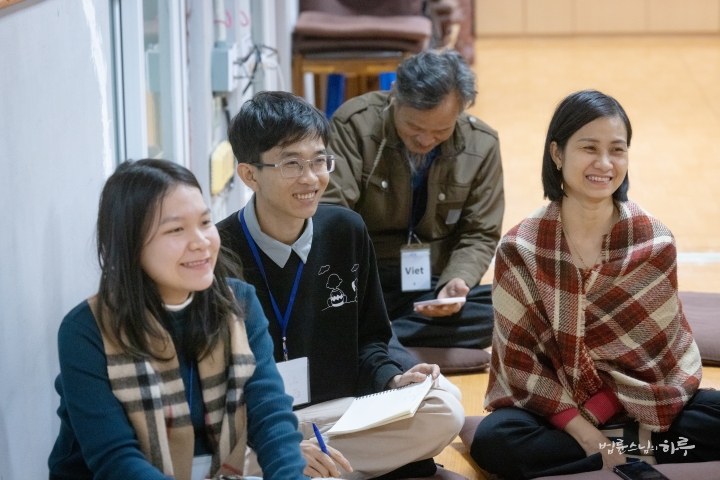
After three hours of conversation, the Vietnamese youth offered three prostrations to Sunim with gratitude.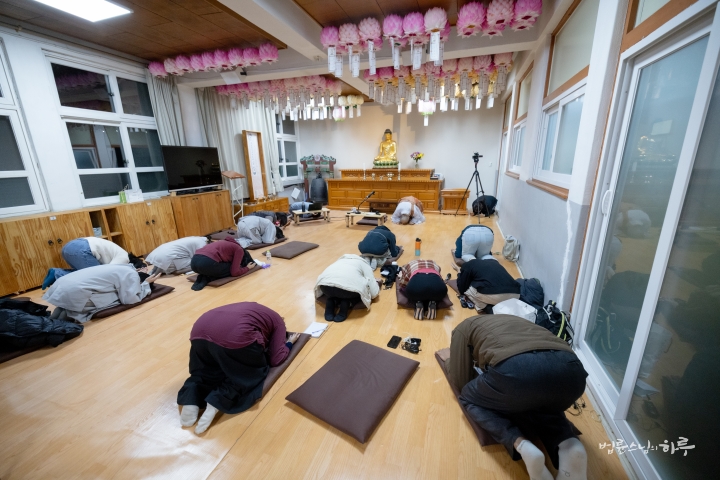
The Vietnamese youth presented Sunim with various gifts they had brought from Vietnam, including rice, salt, and coffee produced there. One young person said with a shy smile.
“I’m not giving a gift to Sunim. Sunim accepting my gift is the gift to me.”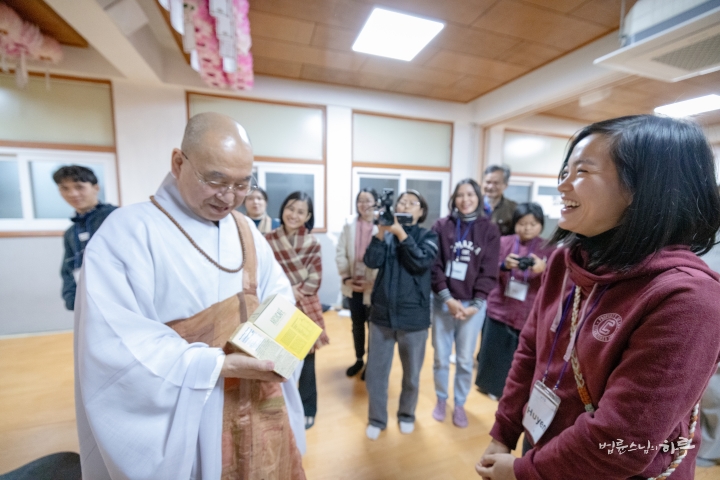
Sunim also gave the Vietnamese youth books of Hope Letters translated into Vietnamese and some pocket money as gifts.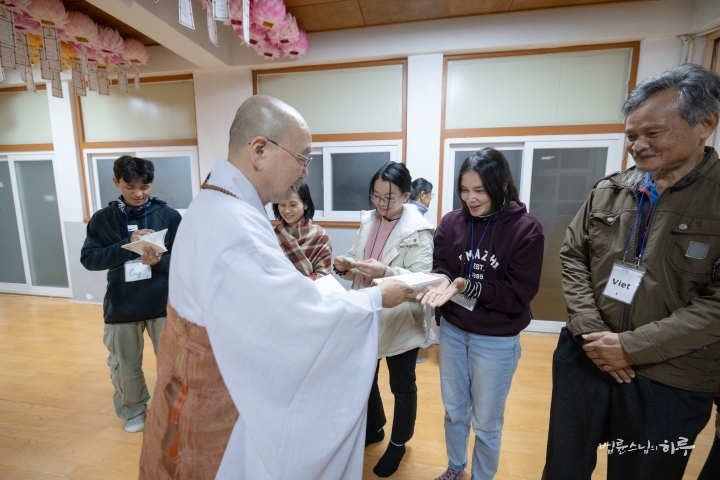
After exchanging gifts, since today was the first and last time together with the Vietnamese youth, they took commemorative photos.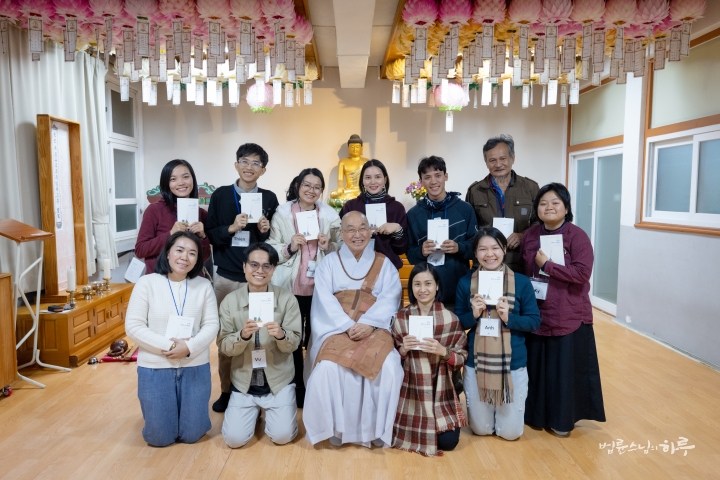
Sunim encouraged them to learn a lot during their remaining time, then bid farewell to the Vietnamese youth.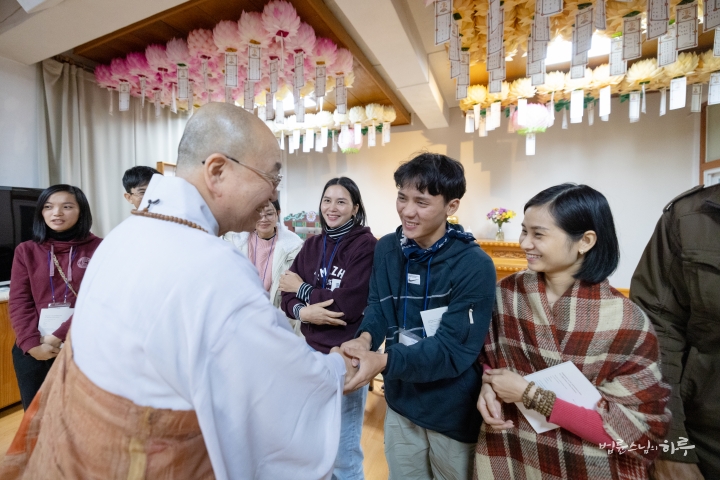
Tomorrow, Sunim will depart from Dubuk Jungto Retreat Center at 3 AM to travel to Seoul. In the morning, he will hold a Weekly Dharma Assembly at Jungto Social and Cultural Center, and in the afternoon, he will meet with guests at The Peace Foundation before participating online in the India Jungto Society’s temporary board meeting. He is also scheduled to meet with foreign affairs and security experts.





